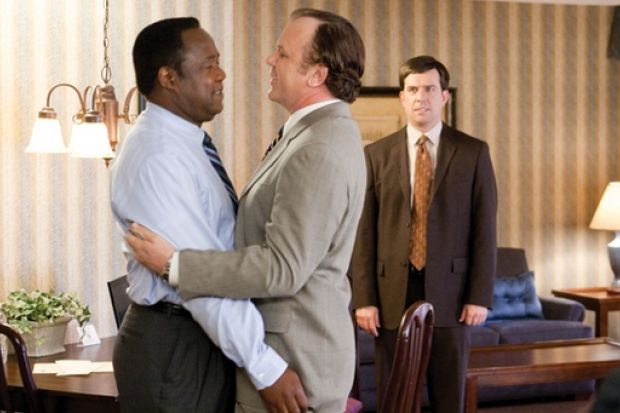Cedar Rapids
Directed by Miguel Arteta
Starring Ed Helms, John C. Reilly and Anne Heche
Released in the UK on 29 April
"I took you on when you were 16, thinking, 'That kid's gonna go places', and somehow...you didn't!" Insult masquerading as humour, directed at the protagonist of Cedar Rapids, Tim Lippe (played by Ed Helms). Lippe is an insurance salesman asked to represent his company at a convention after his colleague Roger Lemke dies from auto-erotic asphyxiation. He has led a sheltered life; not only has he never flown in a plane, but he neither drinks alcohol nor takes drugs. By the end of the convention, held in Cedar Rapids, Iowa, Lippe is a changed man. He has had sex with a colleague, fallen in love with a prostitute, consumed powdery substances, attended a lesbian wedding and bribed his way to the top of his profession.
Cedar Rapids is a coming-of-age drama with a middle-aged man as the protagonist, so retreads similar territory as The 40-Year-Old Virgin (2005). While watching it I reflected that Lippe's development into adulthood must at some stage have been derailed, and that such people probably do exist. In case we're in doubt, Lippe has a funny hairstyle and wears clothes that suggest he's a sort of child; he doesn't have a family but (disturbingly) is having an affair with his former schoolteacher (played by Sigourney Weaver); and, when approached by the hotel prostitute, reacts by giving her sweets.
All this is designed to inspire the kind of uncomfortable laughter that comes from revulsion and alienation - as when we see a dog licking its anus. But isn't it vaguely childish to laugh at such things? The film's jokes about defecation, sexual orientation and sex in general presume on the part of its audience conservative norms that may be widespread in middle America, but which are surely not universal. Take, for instance, the callousness with which Lemke's death is described, as if it were a joke: "We found him in a bathroom, he had a belt tied round his neck - and he was half naked! He was a pervert all along."
One has a right to expect better, not least because there are good actors here. John C. Reilly, excellent in Boogie Nights (1997) and Magnolia (1999), looms large in the first half of Cedar Rapids as Dean Ziegler, another insurance man. Greeting his black colleague Ronald Wilkes (Isiah Whitlock Jr) with a bear hug, he turns to a startled Lippe and says, "What's wrong? You never seen a chocolate-vanilla love sandwich before?" - another quip suggesting unease about sexual and racial matters. Weaver is thrown away as Macy Vanderhei, the teacher with whom Lippe is involved. She is responsible for the one scene in which any of these thinly drawn characters shows any depth, when she rejects Lippe's guilt-inspired proposal of marriage and explains her desire to remain single for as long as possible.
The conceit of Cedar Rapids is that Lippe is a grown-up child, but the hypocrisy of this film consists of holding him up to ridicule and thereby reducing the audience to a childish level as well. The retarded, damaged or deluded characters are wheeled out in order to make the audience feel smug about being somehow "better". For much of the film I felt as if I had been dragged to a mental hospital to laugh at the inmates. That Cedar Rapids failed to make me laugh at any point served only to underline how offensive so much of it is.
I'd be less exercised were it not that such films are increasingly fashionable on both sides of the Atlantic. This is how fascism works: categories of people are singled out as alien and held up for ridicule as such. It might be argued that Cedar Rapids tries to be gay-friendly and features a black man as one of its central characters, but its repeated jokes about homosexuality, and inability to resist racial stereotyping (Wilkes is made to impersonate Omar from The Wire), tell a different story.
My guess is that the popularity of these so-called comedies has something to do with post-credit crunch stagnation and anxiety about immigration. Can it really be that we are so insecure as to need this kind of reassurance? Cedar Rapids is a reminder that cinema has the power not merely to ennoble but to coarsen, and even while watching it I was reminded of those lines by Yeats: "We had fed the heart on fantasies, The heart's grown brutal from the fare."
Register to continue
Why register?
- Registration is free and only takes a moment
- Once registered, you can read 3 articles a month
- Sign up for our newsletter
Subscribe
Or subscribe for unlimited access to:
- Unlimited access to news, views, insights & reviews
- Digital editions
- Digital access to THE’s university and college rankings analysis
Already registered or a current subscriber? Login
